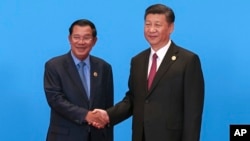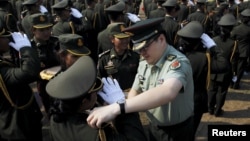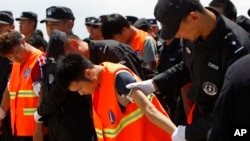Long-time ruler Prime Minister Hun Sen last week tried to reassure Cambodians that the huge influx of Chinese investment and immigration into the country was good.
He called out opposition criticism of Chinese influence as “ignorant” and said most of the Chinese arrivals to Cambodia were tourists who did not stay in the country.
His comments came after Liao Jingrong, head of China's General Department of International Cooperation, called on Cambodia to do more to protect Chinese citizens and investments in the Kingdom.
More than 1.2 million Chinese nationals visited Cambodia last year, a figure that is expected to rise to 2 million by 2020. Chinese investment is also on the rise, increasing by $200 million to $4.8 billion between 2015 and 2016.
The surge in Chinese influence in Cambodia is mirrored by a downturn in relations with the United States and the European Union over deteriorating human rights and political freedoms in the country.
According to the finance ministry, Cambodia owes China more than $4 billion, or about two-fifths of the country’s outstanding debt. The figure is significantly higher than the combined multilateral debt owed to institutions such as the World Bank and Asian Development Bank.
Analysts who spoke to VOA last week warned that this growing reliance on China as a source of development assistance could influence the country’s policy priorities.
Ear Sophal, author of “Aid Dependence in Cambodia” and co-author of “The Hungry Dragon: How China’s Resource Quest is Reshaping the World”, said in an email that China’s excess capital and the large male-dominated workforce was a “win-win” for China.
“I would say Cambodia is far too deep in compared to other Asian and African countries that deal with China,” he said. “Cambodia must always remain independent and sovereign.”
Hun Sen’s positive response to China’s request for greater protection of its citizens came as no surprise to Sebastian Strangio, author of “Hun Sen’s Cambodia”.
“Chinese investment and diplomatic backing have become vitally important for Hun Sen’s rule, as he seeks freedom from the democratic demands of the West,” Strangio said. “The Cambodian government, therefore, has good reasons to downplay the negative effects of Chinese investments while emphasizing the positives.”
“Riskier is that Asean may come to resent its de-facto support for Chinese ambitions in the region,” he added.
China is one of a small number of countries that have openly supported the forthcoming general election in July following the dissolution of Cambodia’s main opposition party late last year. In March, Cambodia joined a military exercise with China called “Golden Dragon”, while it has left the “Angkor Sentinel” exercises it held with the United States for the past eight years.
Hun Sen has accused Washington of backing a plot to overthrow him led by the Cambodia National Rescue Party leadership, allegations that, while not substantiated, were used to dissolve the party and jail its leadership.
As Chinese influence in Cambodia has grown stronger, so too have concerns over reported rising crime rates and the influence of Chinese organized crime groups.
Over the past five years, Cambodia has deported more than 1,000 Chinese nationals for alleged criminal activity, including extortion and online scams.
In February, Yun Min, the governor of Preah Sihanouk province, penned a report expressing concern over the influx of Chinese nationals in the area and a supposed corresponding rise in crime.
Last week, three children were reportedly drugged at a local Chinese-owned nightclub, further stoking fears in the area.
Strangio said that the fast pace of growth in Sihanoukville was a “symbol of the intimate relations between the two countries.”
“It echoes shadowy casino-based tourism enclaves in Laos, and along China’s border with Myanmar,” he said. “But it seems that Cambodia is fast moving towards an unhealthy degree of economic and political dependency on Beijing.”
Sophal said it was not a surprise that locals were put out by the rapid pace of development, as while Chinese projects received state backing local businesses were being pushed out of popular tourist areas.
“At the same time, Chinese mafia has arrived to kidnap Chinese investors to the point of alarming the governor to the point of writing a memo that got leaked and causing the Chinese embassy to encourage Cambodia to enforce local laws,” Sophal said. “Easier said than done when there is little respect for the rule of law and money speaks when politicians don't.”
Similarly, San Chey, country director of the Affiliated Network for Social Accountability, said animosity between Cambodian and Chinese residents would likely escalate.
“Actually we are already seeing the impacts. That is why we are concerned about the future. Conflicts between Cambodian and Chinese citizens could happen if the authorities do not put restrictions on Chinese nationals,” he said.
On Monday, Hun Sen defended the relationship with China, saying other countries were “jealous” of Beijing’s rise.
Sok Eysan, ruling Cambodian People’s Party spokesman, said the claims made by analysts were racist.
“If we focus on Chinese nationality it is racist and we should not do so,” he said. “We should not make comments that inflame racism.”
He added that the request from China to protect its citizens did not infringe on Cambodian sovereignty. “There are many good Chinese people, like investors, who need protection,” he added.











